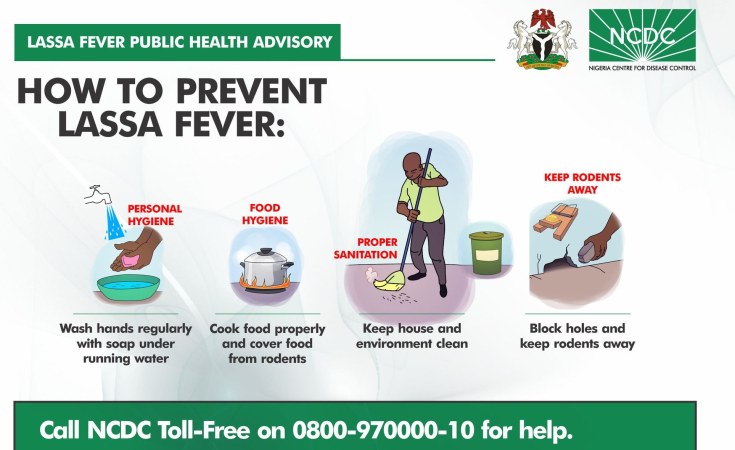Lassa fever is an acute viral haemorrhagic fever caused by the Lassa virus.
The Nigeria Centre for Disease Control and Prevention (NCDC) on Saturday said 1,170 confirmed cases of Lassa fever and 200 deaths have been recorded in the country as of 3 December.
In a statement posted on its website, the NCDC said the confirmed cases were recorded from 28 states and 114 LGAs across the country.
The statement, signed by the Director-General of NCDC, Ifedayo Adetifa, indicates that the country also recorded 8,542 suspected cases of Lassa fever.
Mr Adetifa said Nigeria has continued to record a steady increase in states reporting Lassa fever for reasons not limited to improved surveillance, better community awareness, environmental degradation from climate change and other deleterious human activities in the environment.
He said in 2021, 510 confirmed cases were reported across 17 states and 68 LGAs and in 2022, Nigeria reported 1067 confirmed cases across 27 States and 112 LGAs.
"In 2023 alone, 28 states and 114 LGAs have reported confirmed cases of Lassa fever and as of December 3, there have been 8542 suspected cases, 1170 confirmed cases, and 200 deaths (case fatality rate of 17.1 per cent) suggesting 2023 may witness record numbers of cases," he said.
Mr Adetifa noted that Lassa fever outbreaks also involve the infection and death of healthcare workers.
He said such a victim is not just a loved family member, but a spouse, a parent, and often a seasoned healthcare worker and team member.
"This exacerbates the challenge of insufficient human resources for health in the country."
He said the NCDC Technical Working Group has implemented strategic measures to enhance coordination, collaboration, communication, preparedness and readiness for potential surges in Lassa fever cases.
Lassa Fever
Lassa fever is an acute viral haemorrhagic fever caused by the Lassa virus. The natural reservoir for the virus is the Mastomys natalensis rodent (commonly known as the multimammate rat or the African rat).
Other rodents can also be carriers of the virus. The virus spreads through direct contact with the urine, faeces, saliva, or blood of infected rats; contact with objects, household items, and surfaces contaminated with the urine, faeces, saliva, or blood of infected rats, and consuming food or water contaminated with the urine, faeces, saliva, or blood of infected rats. Person-to-person transmission can also occur through direct contact with blood, urine, faeces, vomitus, and other body fluids of an infected person.
Lassa fever initially presents like other common illnesses accompanied by a fever, such as malaria. Other symptoms include headache, general body weakness, cough, nausea, vomiting, diarrhoea, muscle pains, chest pain, sore throat, and, in severe cases, bleeding from ears, eyes, nose, mouth, and other body openings.
The time between infection and the appearance of symptoms of the disease is three to 21 days, but early diagnosis and treatment of the disease greatly increase the chances of patient survival.
People most at risk for Lassa fever are people of all age groups who come in contact with the urine, faeces, saliva, or blood of infected rats; people living in rat-infested environments; people who consume potentially contaminated foodstuff, especially those left open overnight or dried outside in the open, and people who handle or process rodents for consumption.
Lassa fever remains a major public health challenge as poor environmental sanitation, poor awareness, and late presentation of cases fuel the epidemic in Nigeria.


